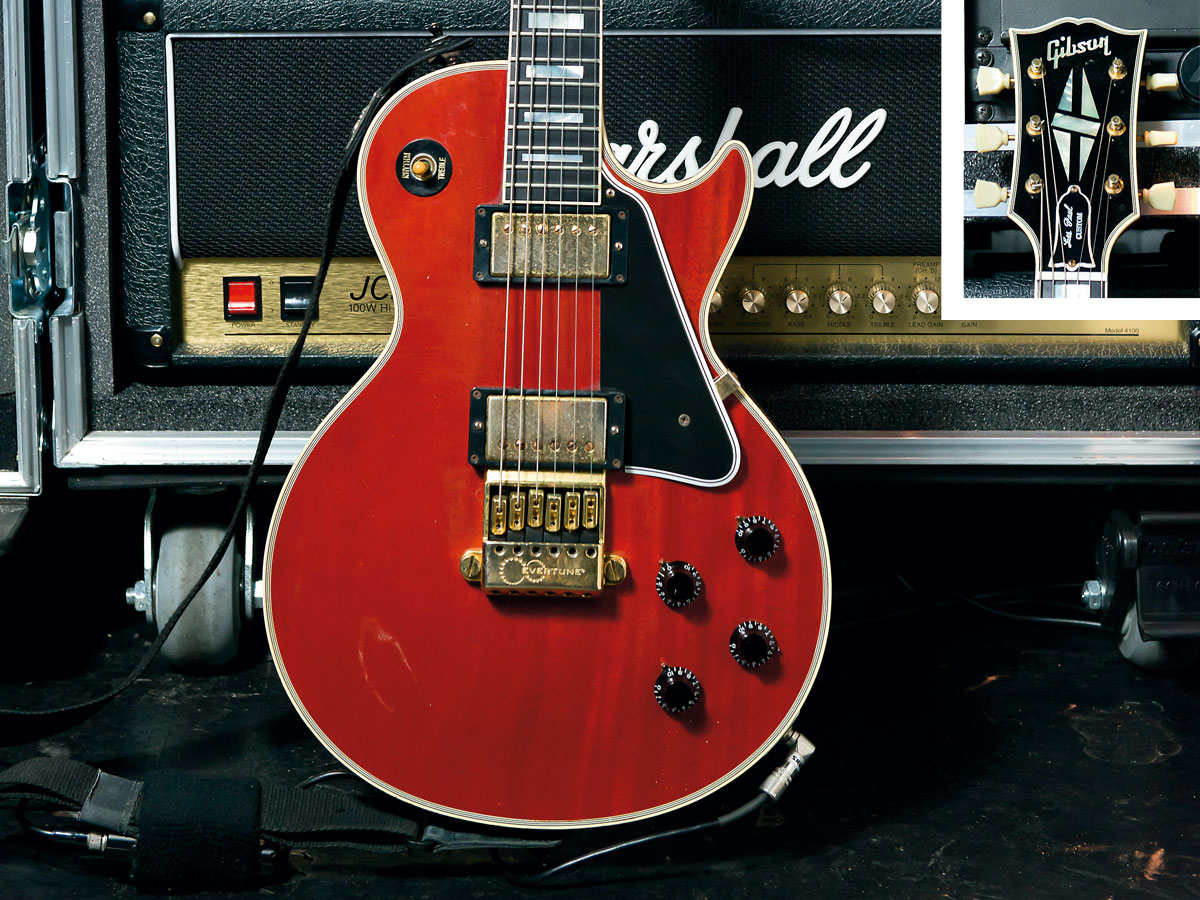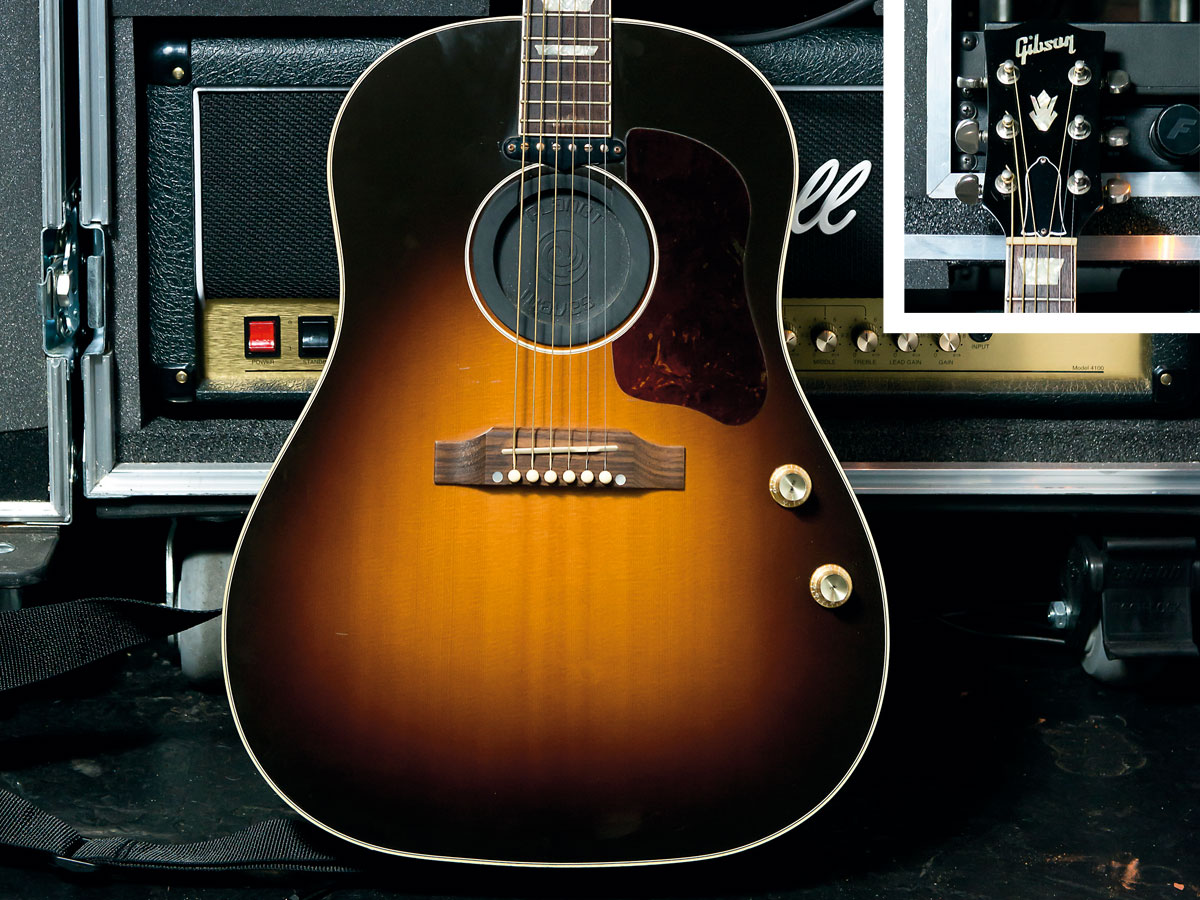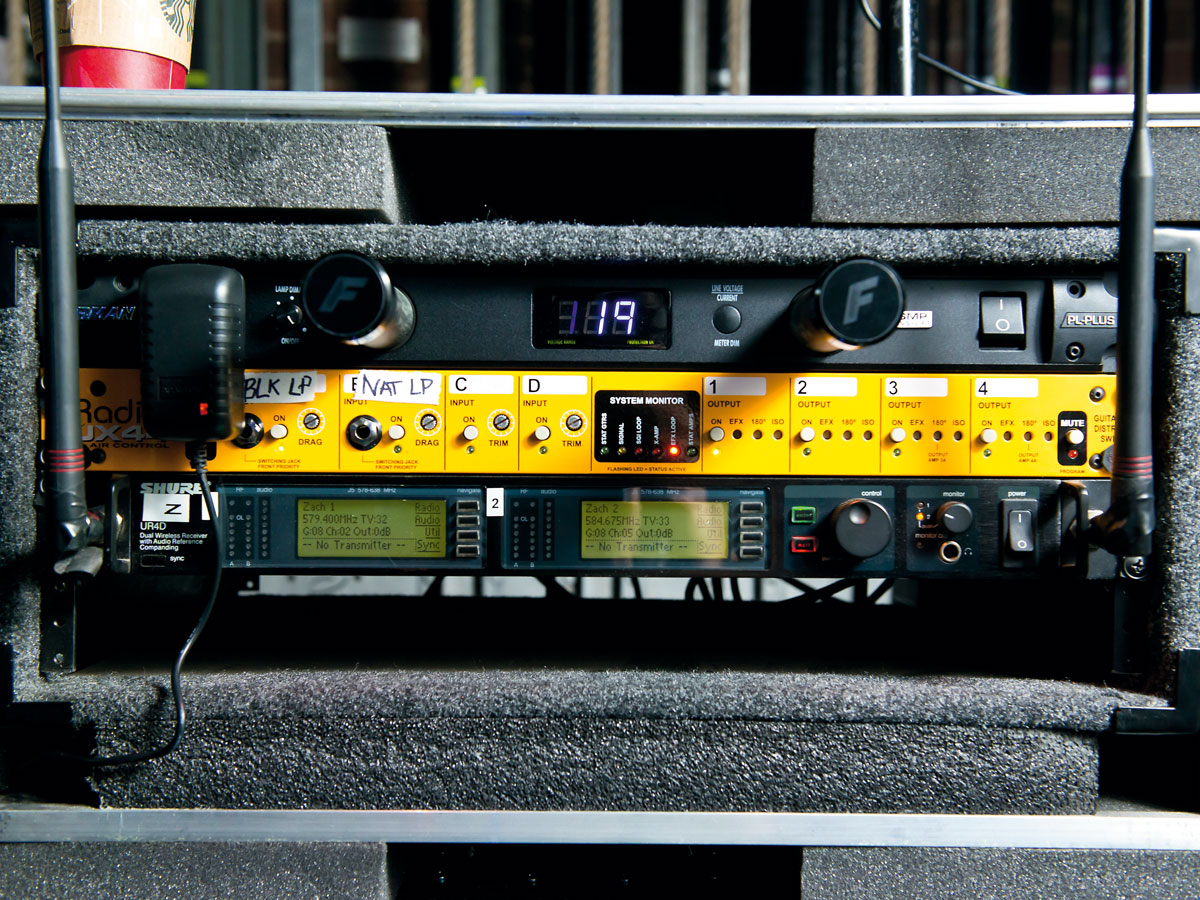Rig tour: Rise Against
The Illinois punks' tonal toolbox
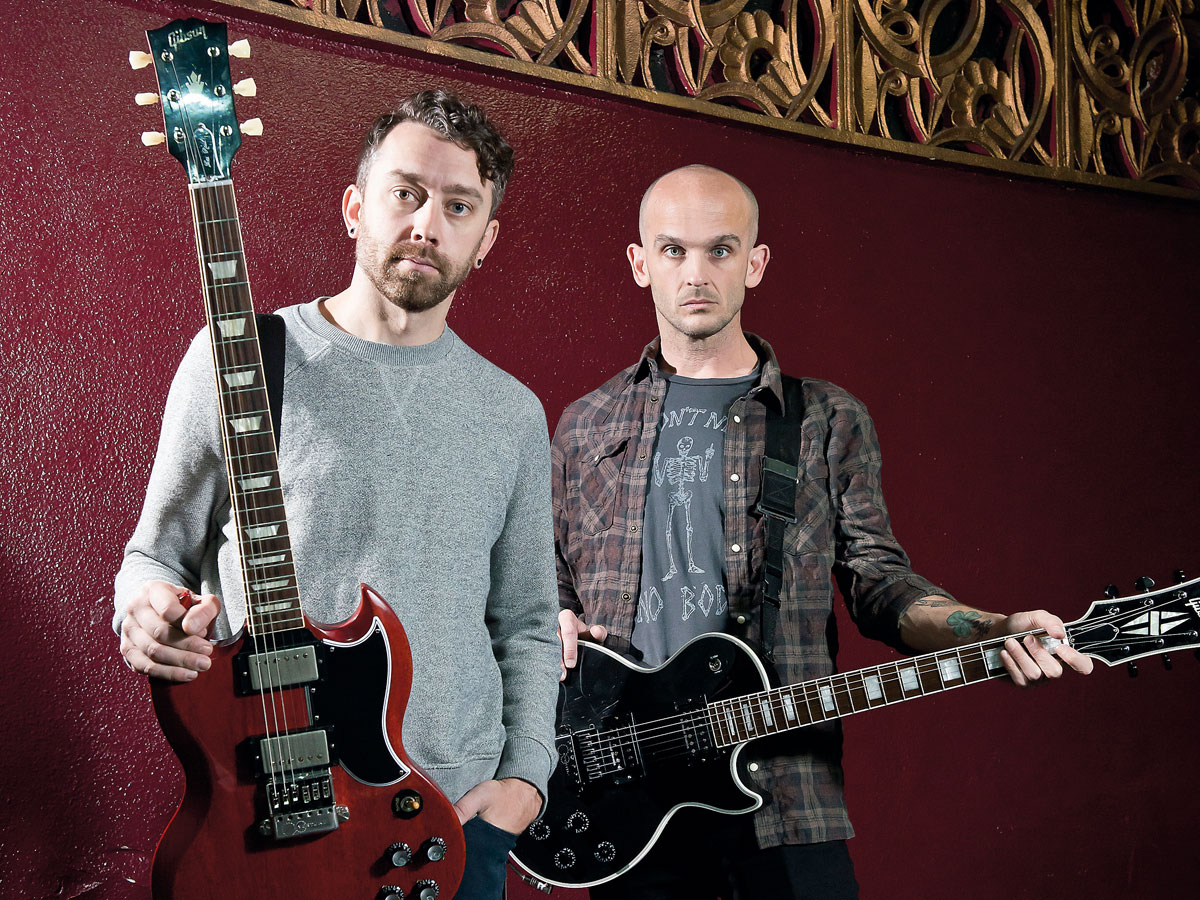
Introduction
From a gaggle of Gibsons to a mass of Marshalls, we poke about the guitars, amps and effects that Rise Against rely on...
Chicago’s ethical rockers Rise Against can lay a reasonable claim to the title of ‘biggest punk band on the planet’ right now. Their last three records have all occupied the very upper reaches of the Billboard charts, but it’s in the live arena that the four-piece really thrives.
Guitarist Zach Blair’s lead embellishments may have become more righteous of late, but Tim McIlrath’s writing still revolves around a proven formula: direct songs with a direct message. It’s the same with their gear: a Gibson, a Marshall and an audience are all these politically-savvy punks need…
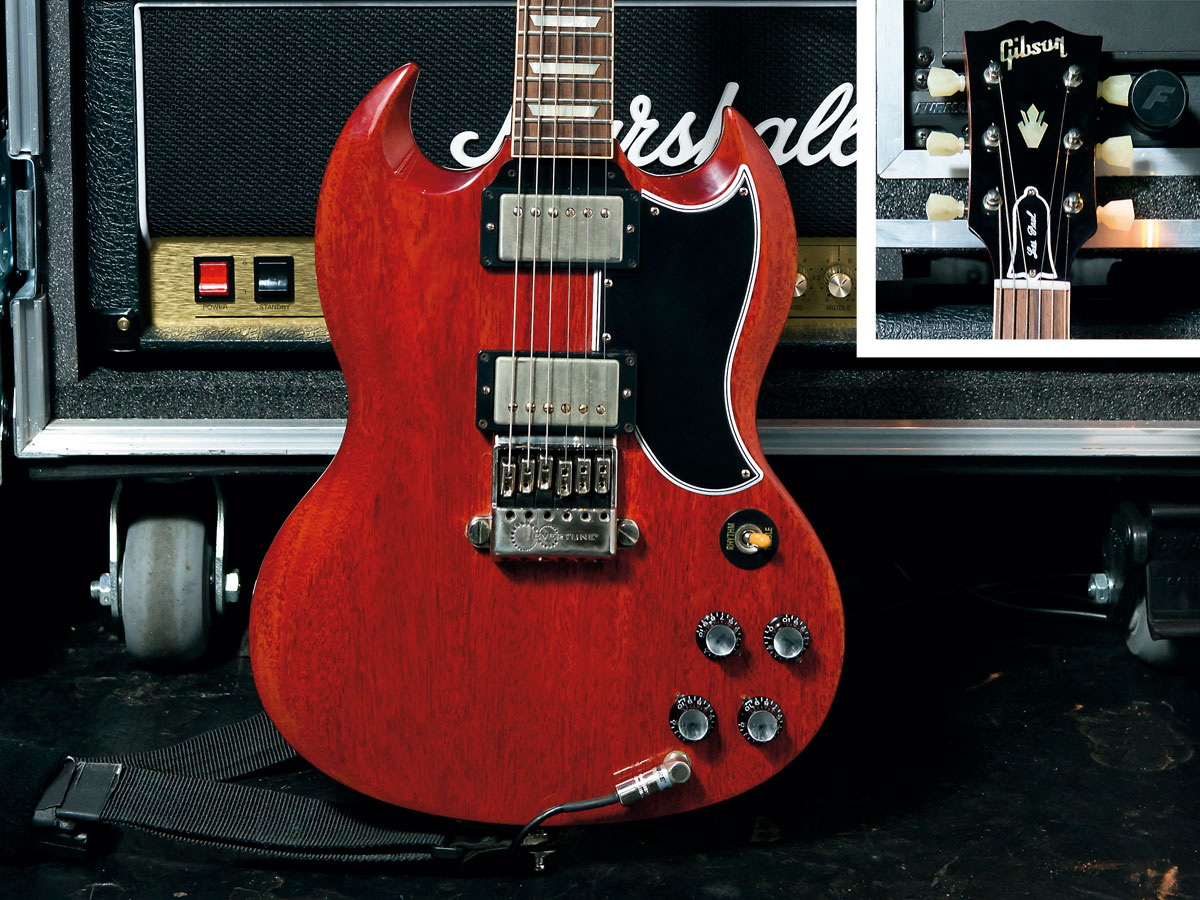
Gibson SG Custom Reissue
Tim: “When I started on guitar I had an ’84 SG and I beat the shit out of it and played it for many years, but I always had the same problem that a lot of guitar players have, which is that SGs don’t stay in tune very well, so I started using a Les Paul a lot more often.
"Then we discovered this company, Evertune, who install these bridges in guitars that keep them [almost permanently] in-tune. I know this has polarised the guitar world and it’s controversial etc., but I just like that I’m finally in-tune and that I can play an SG again. This one is the one I’m playing mostly and it really holds up with my Les Pauls. It’s a lot lighter, too, which is nice when you’re playing for 90 minutes a night.”

Gibson Wildwood Les Paul Custom
Tim: “I bought this at a shop in Louisville [Colorado] called Wildwood Guitars. They’re one of Gibson’s exclusive retailers, so Gibson lets them pick the woods and go in there and fuck with them a little bit, so they give them these signature Les Pauls that you can only get from them.
"We walked in there years ago with the guys from Bad Religion and thought we were in the wrong place, because we’d heard about this legendary store. They have this warehouse with about 1000 instruments.
"It’s a pretty unique instrument, anyway. We also Evertune-d it, because I love it so much and I wanted it to be in-tune. I’ve been playing this one a lot, especially on the last tour, before I got the SG.”
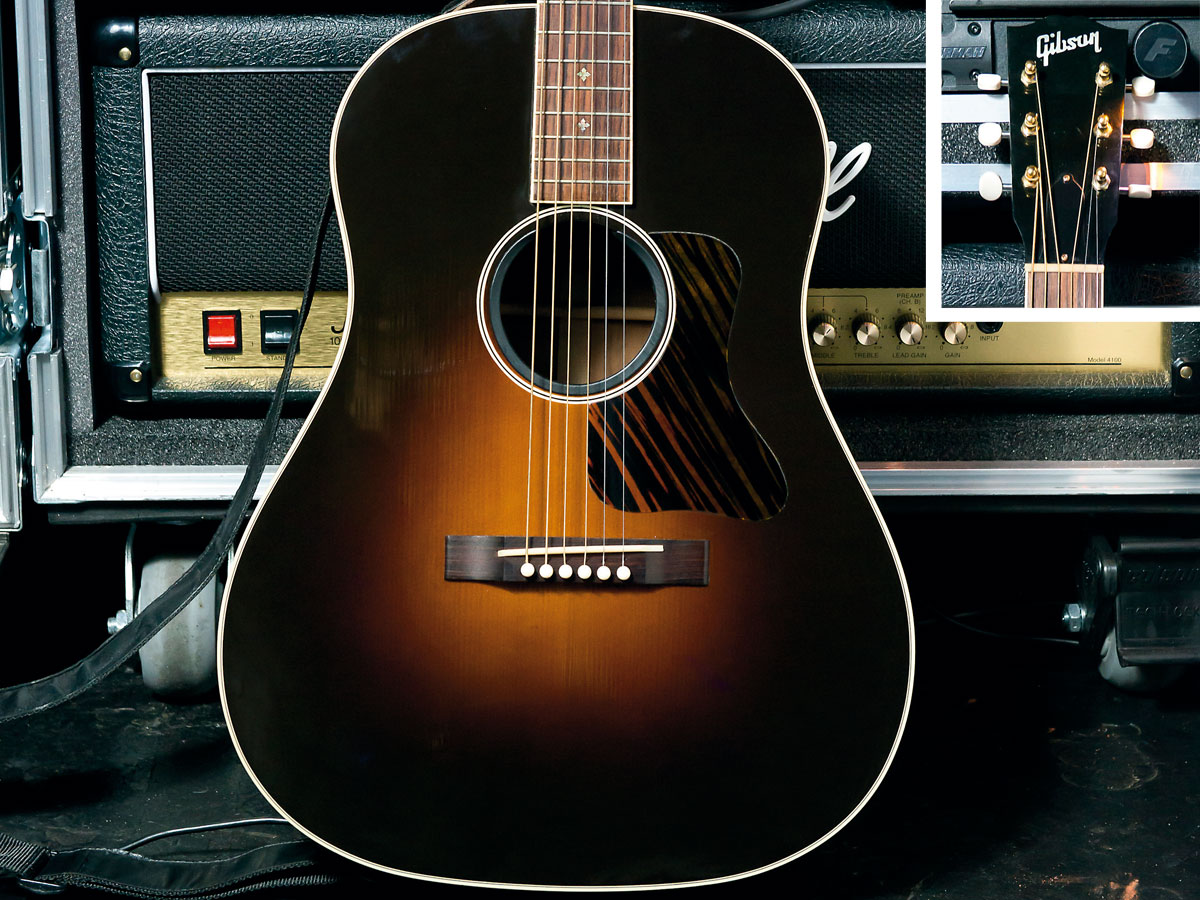
Gibson Jackson Browne Signature
Tim: “I played a show with Jackson Browne, a union rally in Wisconsin, and he pulled out this guitar and it sounded amazing.
"I asked him later, ‘What guitar was that you were playing? It sounds incredible.’ He was like, ‘Well, it’s my guitar.’ I was like, ‘I know it’s your guitar!’ He was like, ‘No, it’s my signature guitar!’ I was like, ‘Oh, yeah. You’re Jackson Browne! Of course you have a signature guitar!’
“So I went out and got one and then promptly cracked the headstock off on tour! So it’s been repaired, good as new. It’s just a much wider, fatter-bodied acoustic: a big, boomy, incredible-sounding guitar.”

Guitar philosophy
Tim: “I’m not really a guitar person. I see them as tools. It doesn’t matter what you have in the rack, it’s what you do with it.
"If you’re on the search for the perfect instrument, stop being on that search. Start writing songs, playing shows, practising and playing. The guitar doesn’t matter, what matters is what you’re doing with it.”
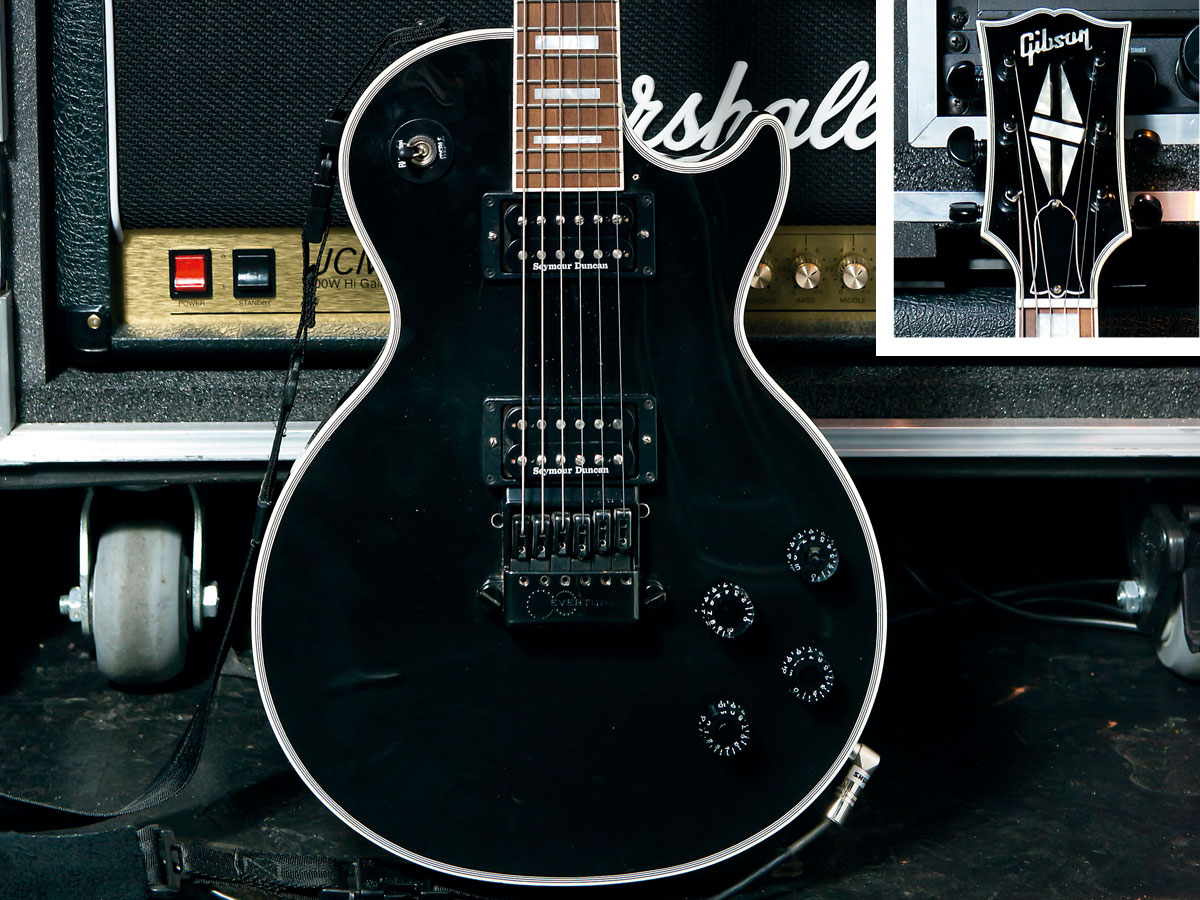
Gibson Les Paul Classic Custom
Zach: “I like the Classic Custom line because they build them on the old specs. When I was a kid, I went to Guitar Center and I bought a Classic Custom Les Paul. That was the guitar I could afford.
"And it looked like a Standard: it wasn’t like a Les Paul Studio where it wasn’t bound and had dots on the inlays - I was a big aesthetics kid - so this looks like a Custom, but the only difference is it’s not got the double-binding… I put Seymour Duncan Distortions in it and black hardware, because I wanted it to look more metal!
“They’re not chambered, but putting in an Evertune bridge on your guitar is like putting a tremolo in it: it’s major surgery and it cuts a huge chunk out of it. As Tim said, I know that the guitar community is polarised by these bridges, but man, I’m not Evertune-ing a ’59 Sunburst and, for what we’re doing, it makes live tuning so perfect. We have friends giving us shit about it already, but whatever!”
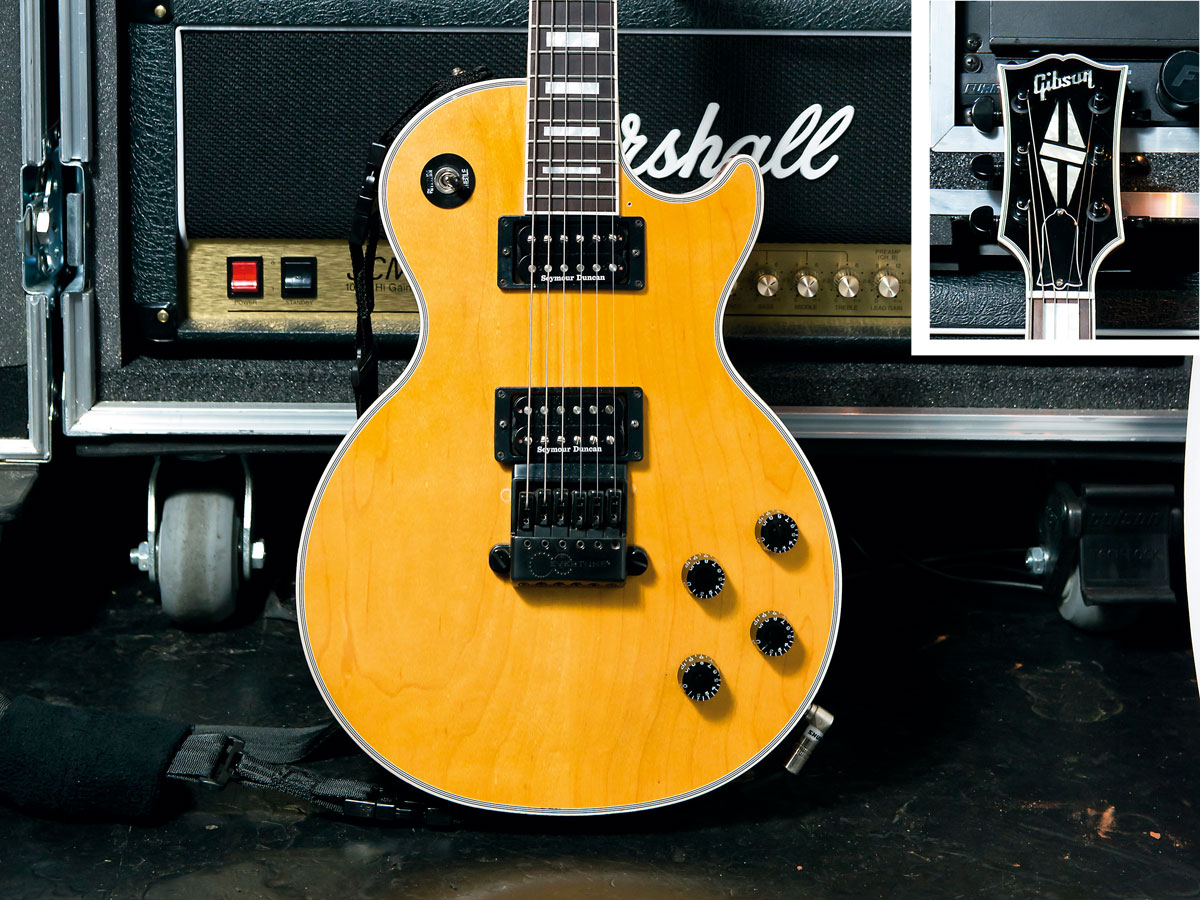
Gibson Les Paul Classic Custom
Zach: “This is the backup. It’s also a Classic Custom and I recorded 80 per cent of our new record which this particular guitar.
"Again, black hardware, because I’m a nerd and Seymour Duncan Distortion pickups. I actually like this one a little bit more than the black one. It plays a bit better, but again: not chambered. A real Les Paul. And it’s rad!”
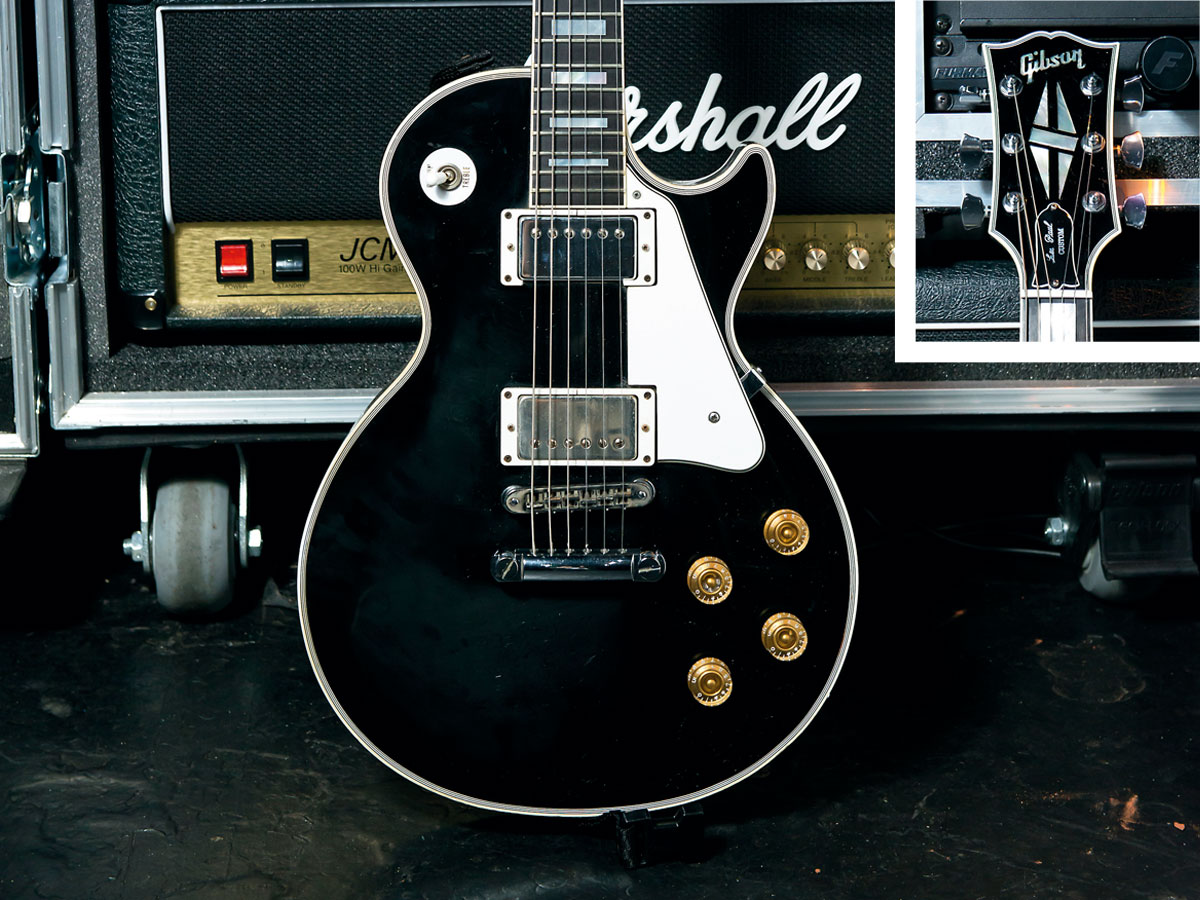
Gibson Les Paul Classic Custom
Zach: “I actually have a third guitar here that’s not Evertune-d and this is one that I just wanted to look like Ace Frehley’s [Les Paul].
"He had the white contrasting plastic and the three humbuckers and then the gold speed knobs. Mine doesn’t have three humbuckers, but I wanted the real stark white. I used this for 95 per cent of the Endgame tour. It’s still out here. Maybe I should send it home!”
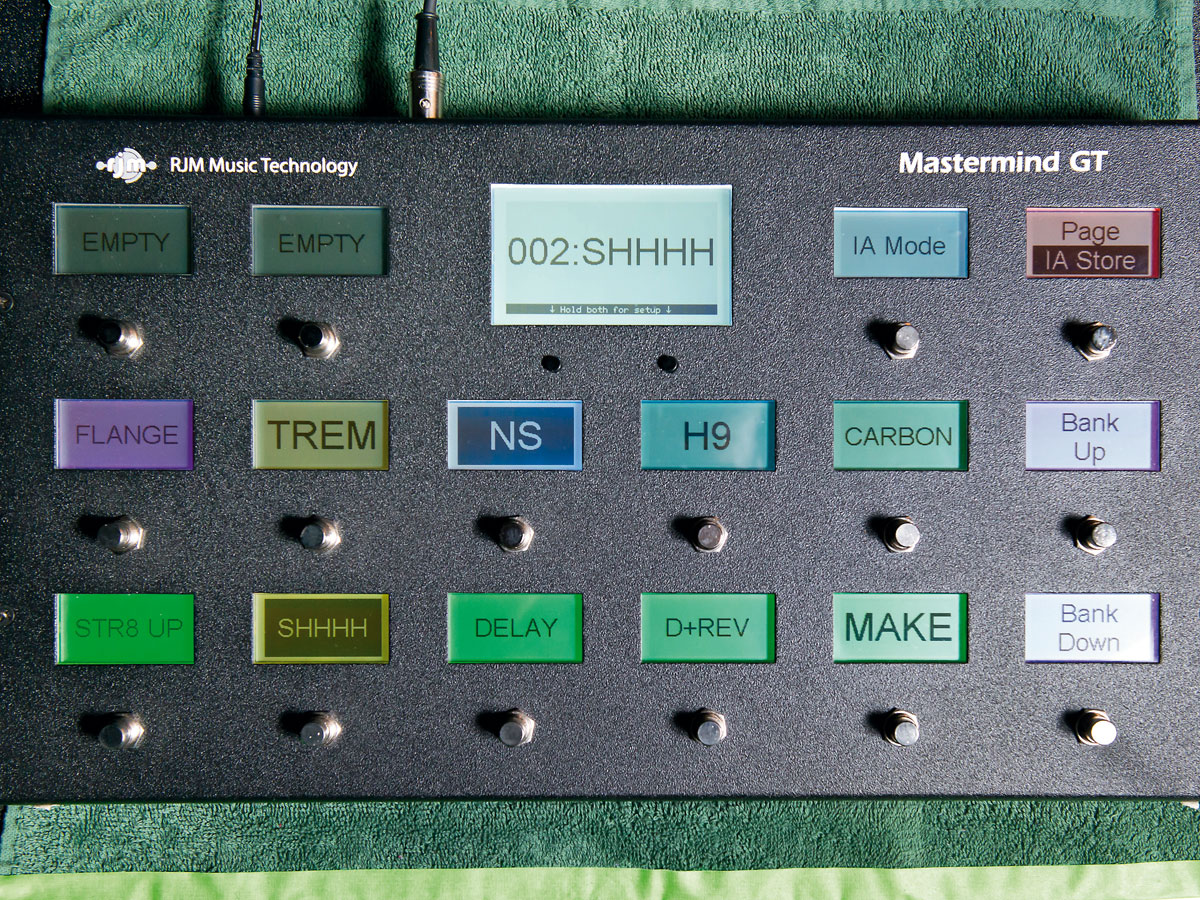
RJM Mastermind GT
Zach: “These are our new amp gizmos! We wanted to step into the future a little bit, which we hadn’t done before.
"We were just plugging Gibsons straight into Marshalls - which hasn’t ever failed AC/DC - but we had some ideas for things where we could tidy some things up.
"We’re using these RJM Mastermind GT pedalboard switching systems. They’re really cool, because you’re still going from your guitar to your pedal to your amp, but this way you can set it to change two or three pedals simultaneously. Our guitar tech Jeff Bilson -who we all know and love dearly -he handles all of this [switching], so it makes his life much easier.”
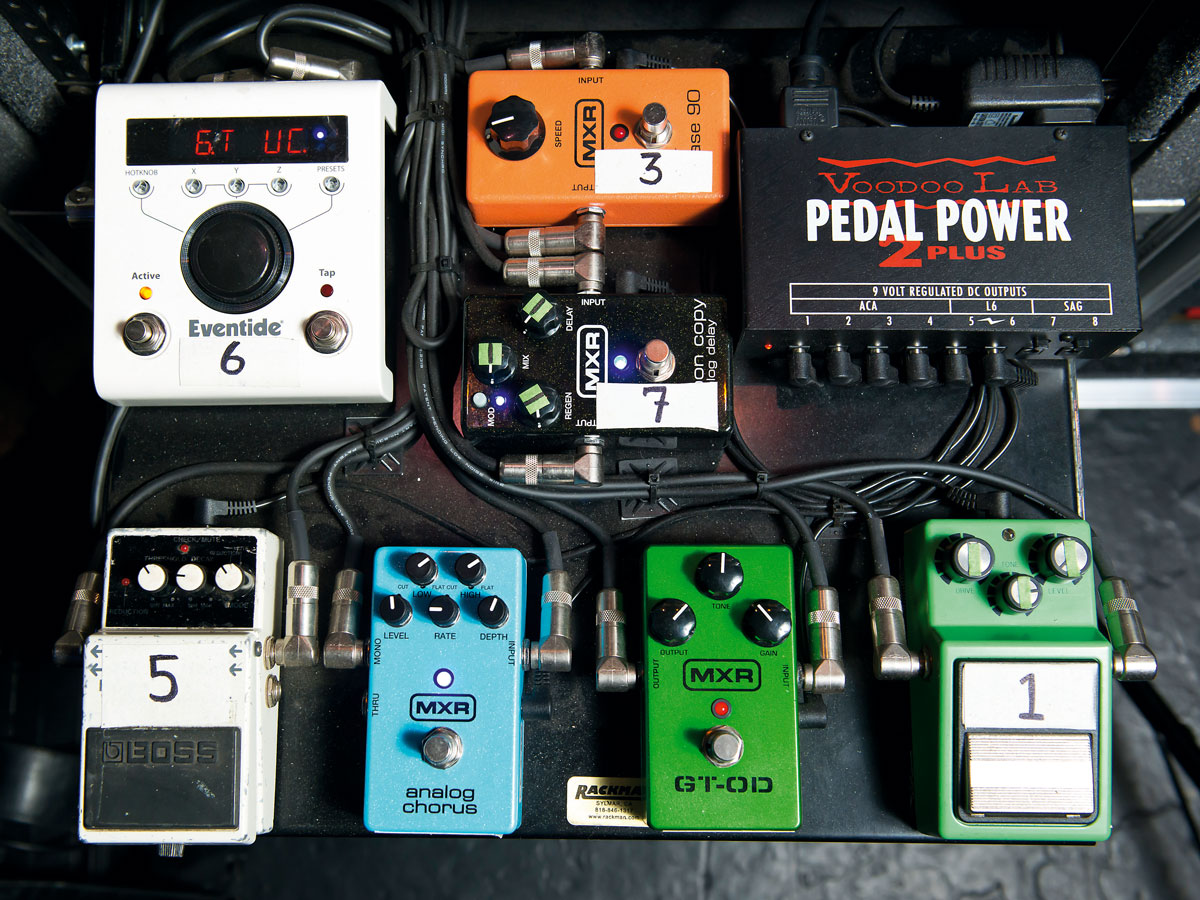
Zach's board
Zach: “I’m using an Ibanez Tubescreamer, an MXR GT-OD and Analog Chorus and also the MXR Carbon Copy Delay.
"I was using some Boss pedals, but then the MXR people were good enough to bring out their own versions of a good chorus and a good overdrive for me and they’ve been great. We’ve also been using these Eventide H9 pedals. We’ve barely skimmed the surface on these things so far. They can pretty much do everything that all of our other pedals can do, but we just got them and we’re still exploring.”
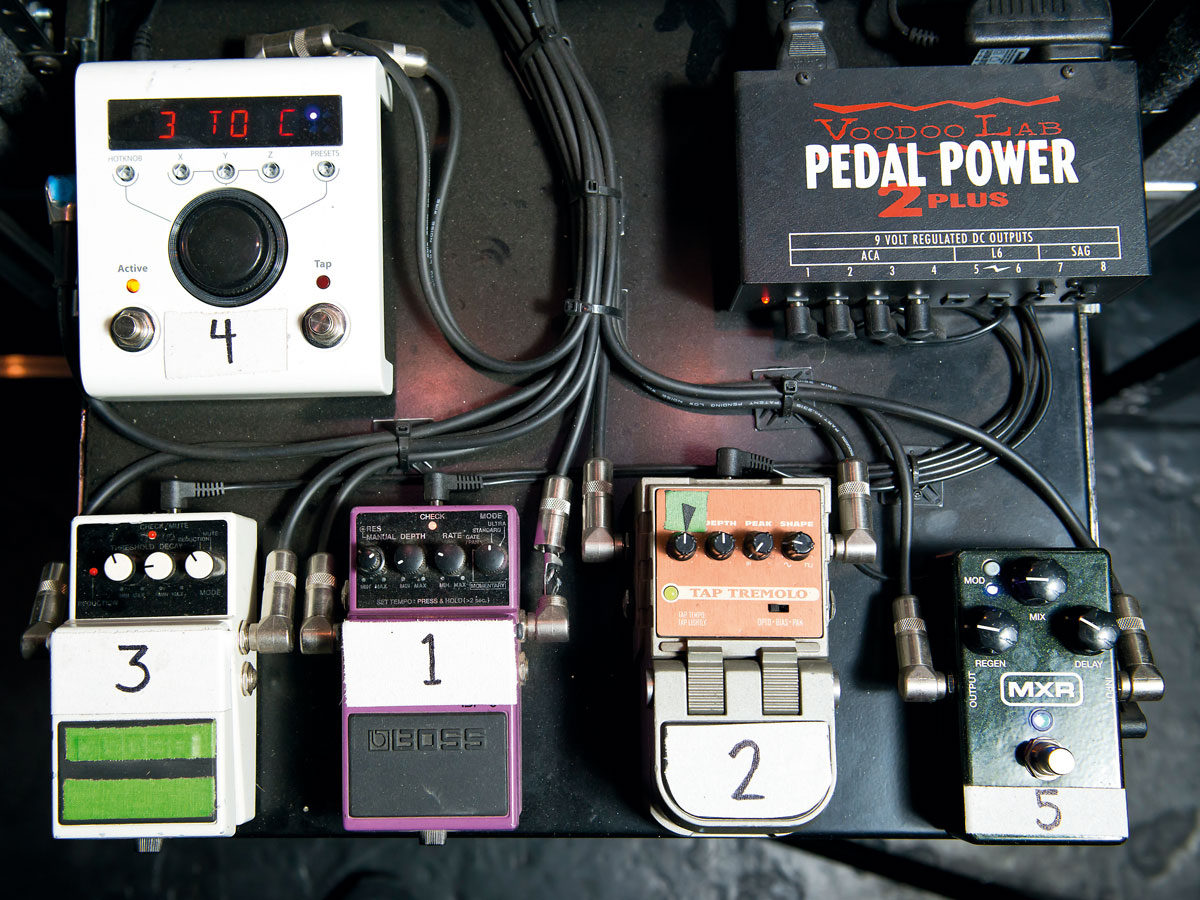
Tim's board
Zach: “Tim’s got the Boss Noisegate, the Boss Flanger, an Ibanez Tap Tremolo and then a Carbon Copy Delay.
Tim: “Essentially, it’s stuff that we came across during the recording of the songs. When we’re writing songs, we don’t mess with pedals, we just plug guitars into amps. It’s only in the studio that we find all the different toys and gadgets to add to different parts. That’s what these are: bits and pieces from the most recent record, The Black Market mainly.
"I do a lot more clean tone stuff than Zach does, so that tone has to be just right. We’ll spend days in the studio trying to get the right clean tone, so we’ll try and simulate that with some of these. It’s all fairly simple stuff: delay, reverb and tremolo. We trust Jeff - he’s like our ‘artist’ back here - to introduce these colours to the songs and he does a great job of it.”
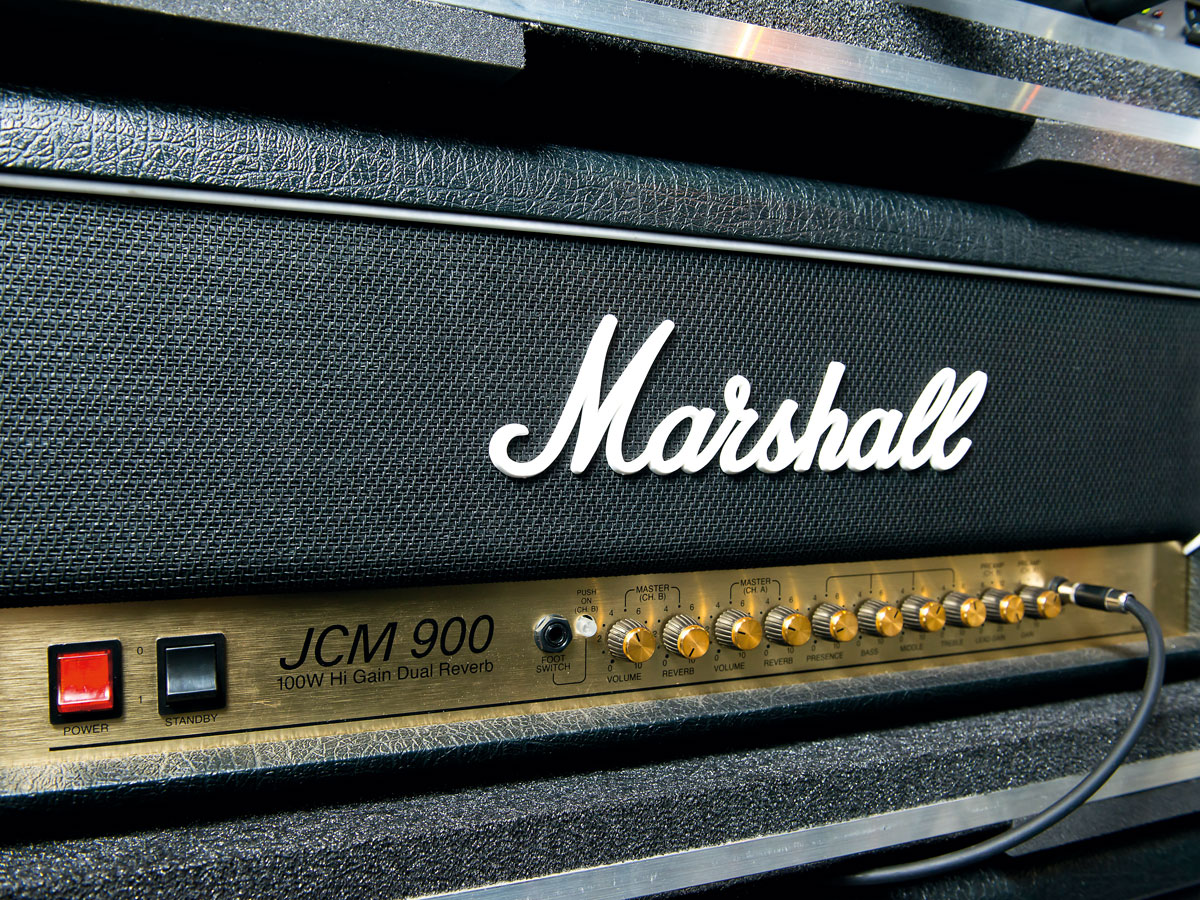
Marshall JCM900 heads
Zach: “There are some JCM900 haters out there, but we both love them. We’ve used them on pretty much every record.
"There’s one magic one in the studio we use in, the Blasting Room, in Fort Collins, Colorado and they’re amazing. We’re using rentals, because we’re in Europe right now. At home I have a hot-rodded JMP, an old 70s Marshall head, and that’s what I’ve been using for the last two or three years now.”
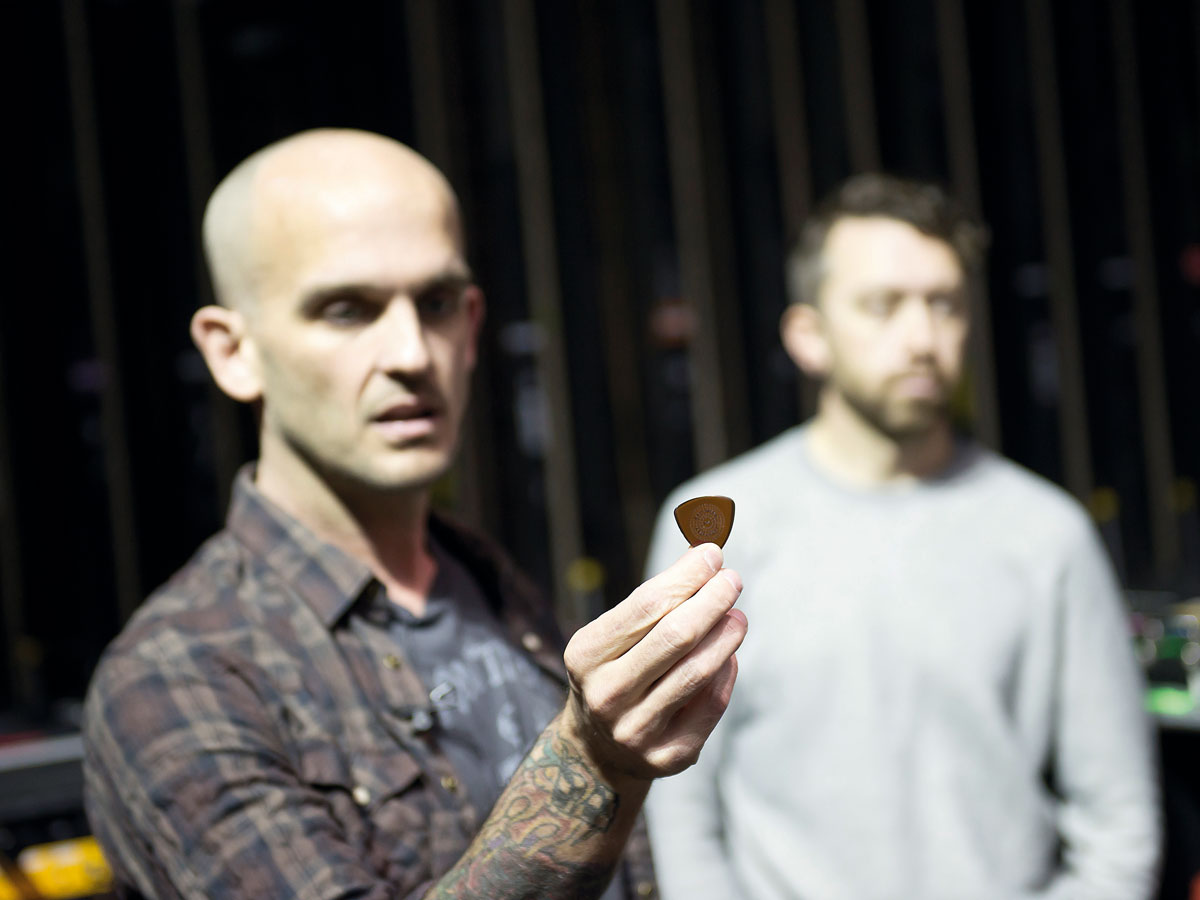
Picks
Zach: “Lately I’ve been using these Dunlop PrimeTone picks. They simulate tortoiseshell - because actual tortoiseshell is kinda fucked!
"There’s a tone and a certain attack that you get with tortoiseshell and Dunlop have sort of done it with these. I use big, crazy rounded triangle picks. It’s a long story, but I acquired one of Kerry King’s picks, because I’m a huge Slayer fan, and I started using it in sound checks and thought ‘This is awesome!’
"It’s a cool pick… I can’t believe I’m talking about picks!”
Want more Rise Against? Check out our full rig tour video below...
Matt is a freelance journalist who has spent the last decade interviewing musicians for the likes of Total Guitar, Guitarist, Guitar World, MusicRadar, NME.com, DJ Mag and Electronic Sound. In 2020, he launched CreativeMoney.co.uk, which aims to share the ideas that make creative lifestyles more sustainable. He plays guitar, but should not be allowed near your delay pedals.
